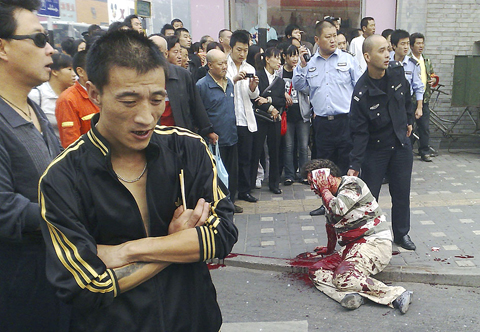An explosion destroyed a small restaurant in a busy section of Beijing early yesterday in an incident that could to further raise tensions in the capital ahead of National Day celebrations on Thursday.
Police said the blast was caused by a gas explosion and Xinhua news agency said it injured three employees of the restaurant and an unknown number of passers-by.
Residents said the restaurant featured specialties from China’s northwestern Xinjiang region — the scene of deadly July riots by members of the Muslim Uighur minority that left nearly 200 people dead, according to the government.

PHOTO: REUTERS
The blast came amid a massive security clampdown in the Chinese capital to prevent disruptions to sensitive Oct. 1 celebrations marking the 60th anniversary of the founding of communist China.
The incident sent police swarming over the Xinjiekou area of central Beijing northwest of Tiananmen Square, sealing off nearby roads and pushing away onlookers.
Local resident Sun Jia, 43, said she was awakened by the explosion shortly before 9am and rushed from her home to see what had happened.
“I looked and I saw that the building was all crumbled and there was some smoke. And I saw a young man with blood all over the side of his head and one side of his body. It looked like his ear had been badly injured,” she said.
Sun said she did not see anyone else who had been hurt. The management of her residential building told her it was a gas explosion.
Those hurt in the blast were taken to hospital but their injuries were not life-threatening, Xinhua said, citing unnamed sources.
The report said the number of passers-by who were injured was not immediately known.
“According to the initial investigation, the explosion was an accident,” a policewoman said.
The building housing the restaurant had partially collapsed, a reporter at the scene said.
“It was a Xinjiang restaurant. All I heard was one loud boom,” said a man who runs a nearby convenience store.

CHAOS: Iranians took to the streets playing celebratory music after reports of Khamenei’s death on Saturday, while mourners also gathered in Tehran yesterday Iranian Supreme Leader Ayatollah Ali Khamenei was killed in a major attack on Iran launched by Israel and the US, throwing the future of the Islamic republic into doubt and raising the risk of regional instability. Iranian state television and the state-run IRNA news agency announced the 86-year-old’s death early yesterday. US President Donald Trump said it gave Iranians their “greatest chance” to “take back” their country. The announcements came after a joint US and Israeli aerial bombardment that targeted Iranian military and governmental sites. Trump said the “heavy and pinpoint bombing” would continue through the week or as long

TRUST: The KMT said it respected the US’ timing and considerations, and hoped it would continue to honor its commitments to helping Taiwan bolster its defenses and deterrence US President Donald Trump is delaying a multibillion-dollar arms sale to Taiwan to ensure his visit to Beijing is successful, a New York Times report said. The weapons sales package has stalled in the US Department of State, the report said, citing US officials it did not identify. The White House has told agencies not to push forward ahead of Trump’s meeting with Chinese President Xi Jinping (習近平), it said. The two last month held a phone call to discuss trade and geopolitical flashpoints ahead of the summit. Xi raised the Taiwan issue and urged the US to handle arms sales to

State-run CPC Corp, Taiwan (CPC, 台灣中油) yesterday said that it had confirmed on Saturday night with its liquefied natural gas (LNG) and crude oil suppliers that shipments are proceeding as scheduled and that domestic supplies remain unaffected. The CPC yesterday announced the gasoline and diesel prices will rise by NT$0.2 and NT$0.4 per liter, respectively, starting Monday, citing Middle East tensions and blizzards in the eastern United States. CPC also iterated it has been reducing the proportion of crude oil imports from the Middle East and diversifying its supply sources in the past few years in response to geopolitical risks, expanding

An Emirates flight from Dubai arrived at Taiwan Taoyuan International Airport yesterday afternoon, the first service of the airline since the US and Israel launched strikes against Iran on Saturday. Flight EK366 took off from the United Arab Emirates (UAE) at 3:51am yesterday and landed at 4:02pm before taxiing to the airport’s D6 gate at Terminal 2 at 4:08pm, data from the airport and FlightAware, a global flight tracking site, showed. Of the 501 passengers on the flight, 275 were Taiwanese, including 96 group tour travelers, the data showed. Tourism Administration Deputy Director-General Huang He-ting (黃荷婷) greeted Taiwanese passengers at the airport and